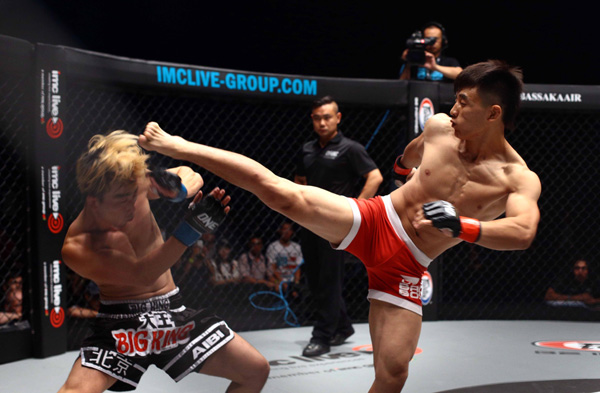Overseas organizers of Mixed Martial Arts (MMA) events are swarming into China, the birthplace of kung fu, one of the most popular types of martial arts, hoping to tap the gold mine in "the world's biggest market" as the governing body loosens its grip on the sports industry.
|
 |
|
Wu Ze (R) wins against Yang Jianbing and to become the champion of the ONE Guangzhou Flyweight Tournament.?[Provided for chinadaily.com.cn] |
World Series of Fighting, also known as WSOF and an American MMA promotion based in Las Vegas, opened its Greater China headquarters in Haikou, Hainan province, on Sunday.
WSOF is expected to stage a debut event in China on Hainan Island in October, adding to the surfing island's charm to sports fans with exciting MMA matches.
ONE Championship, the largest MMA organization in Asia, turned up at South China metropolis Guangzhou with a night of heart-thumping action on June 20.
It was the second event that ONE Championship has staged in China after making a debut in Beijing in 2014.
Fighters from all around the globe battled inside the ONE cage at the sold-out game in Guangzhou. In the main event, Russian fighter Timofey Nastyukhin defeated Yusuke Kawanago from Japan.
Chinese fighters also took the spotlight with spectacular clashes of featherweights and flyweights. Huang Diyuan became winner of the ONE Guangzhou Featherweight Tournament after defeating Ma Jiawen, while Wu Ze took home the win against Yang Jianbing and became the champion of the ONE Guangzhou Flyweight Tournament.
Loren Mack, senior director of public relations of ONE Championship, described the development of MMA in Asia as "astronomical".
Founded in Singapore in 2011, ONE Championship has rapidly grown into Asia's largest MMA organization with a global broadcast to more than 1 billion homes across 75 countries, partnering with FOX and STAR Sports.
With more than 90 percent of the market share in Asia, ONE Championship now stages 24 events a year.
"We are tremendously optimistic about MMA's prospect in China," Mack told China Daily.
"China is the birthplace of kung fu, with stars such as Bruce Lee and Jackie Chan having won fans all over the world.Chinese audiences can watch MMA matches with no volume on TV," Mack added.
"They can understand the fight and the skills, which makes the fight more entertaining for them to watch."
The senior PR director of ONE Championship said that he has seen the demand for MMA events in China grow with the media and business partners inviting the organizer to come back after the first ONE Championship event in the country was held in Beijing last year.
Mack revealed that his organization is planning to stage MMA events in Shanghai, Chengdu and Xi'an in the future.
Chinese people's interest in MMA has grown over the past years.
Unbeatable, a Hong Kong movie featuring two fighters who regain their courage in the face of life's breakdowns while preparing for MMA matches, met with considerable critical and public acclaim and won a box office of more than 100 million yuan ($16 million) in 2013.
Martial arts such as Muay Thai and Jiu-Jits have become popular fitness courses in gyms springing up across China.
"Some people mistake MMA as a brutal game, but actually it's a safe sport. Unlike boxing, a MMA fighter doesn't need to punch more than the other to win," Mack said, adding that ONE championship ensures the safety of fighters by monitoring their health condition all the time.
"MMA is about respect, discipline and self-control. Males and females can get involved in the sport at different levels such as making it a fitness course. It's good for both body and mind," he said.
China is boosting the sports sector by loosening the governing body's grip on the sports industry, which is encouraging to those MMA organizations like ONE Championship and WSOF who aspire for a share of the Chinese market.
The State Council, China's Cabinet, issued a national development plan for the sports industry in October last year, urging the General Administration of Sport of China to loosen its grip on the untapped market and allow businesses and private investors to enter the industry that has been long dominated by State-owned companies.
China's sporting industry is expected to be worth more than 5 trillion yuan by 2025, according to State Council projections, making it a tempting business for investors home and abroad.
Currently, all sporting events must be approved by the GASC, while under the plan, the administration and its branch administrative centers would relinquish the approval and oversight rights for commercial and mass sporting events.